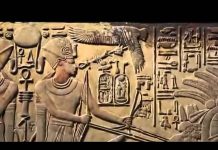Centuries and centuries before Christ was born, Romans, Mesopotamians, Carthaginians, Balkans, Germans and Scandinavians held huge celebrations on or near December 25th to welcome the return of the sun. The Origins of Christmas delves into this history, revealing surprising similarities between the world’s favourite Christian holiday and some of its not-so-religious roots:One of the earliest Santa Claus prototypes was a convict who, during a respite from everyday social restrictions, was chosen to replace the king for the new year festivities and who oft-time was sacrificed as the celebrations drew to a close. Giving dolls to children at Christmas is likely a reversal of an ancient tradition of giving children (i. e. sacrificing them) to the gods of agriculture. The light-hearted custom of kissing under the mistletoe has a serious history. The Celtic Druids called the herb “the all healer” and believed it not only increased fertility of soil and cattle, but that it also cured impotence. The video traces the decision of the early Catholic Church to adopt the centuries-strong pagan celebrations and baptize them with Christian meaning. It follows Christmas to its modern incarnation, no longer a celebration of the return of the sun, now a commerce-driven vehicle boosting sales of everything under the sun. Alternatives to today’s Christmas of consumerism are explored with the introduction of the Public Dreams Society, a Vancouver group determined to return the Yuletide to its lusty pagan beginnings.
POPULAR PICKS
LATEST ADDITIONS
© Copyright 2017-2022 - Gratis Global Ltd. All rights reserved.

































